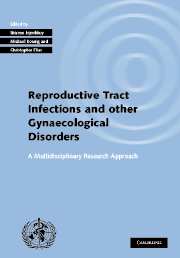 Investigating Reproductive Tract Infections and Other Gynaecological Disorders
Investigating Reproductive Tract Infections and Other Gynaecological Disorders Book contents
- Frontmatter
- Contents
- List of contributors
- Foreword by Paul F.A. Van Look
- Acknowledgements
- 1 Introduction and overview
- 2 Defining reproductive tract infections and other gynaecological morbidities
- 3 The social context of gynaecological morbidity: correlates, consequences and health seeking behaviour
- 4 Reproductive health: men's roles and men's rights
- 5 Study design for the measurement of gynaecological morbidity
- 6 Alternatives to community-based study designs for research on women's gynaecological morbidity
- 7 Community interaction in studies of gynaecological morbidity: experiences in Egypt, India and Uganda
- 8 Definitions of clinically diagnosed gynaecological morbidity resulting from reproductive tract infection
- 9 Laboratory tests for the detection of reproductive tract infections
- 10 Laboratory methods for the diagnosis of reproductive tract infections and selected conditions in population-based studies
- 11 The value of the imperfect: the contribution of interview surveys to the study of gynaecological ill health
- 12 Qualitative methods in gynaecological morbidity research
- 13 Integrating qualitative and quantitative methods in research on reproductive health
- 14 Interpreting results from different sources of data
- 15 Turning research into action
- Appendix A Notes on contributors
- Index
Foreword by Paul F.A. Van Look
Published online by Cambridge University Press: 07 December 2009
- Frontmatter
- Contents
- List of contributors
- Foreword by Paul F.A. Van Look
- Acknowledgements
- 1 Introduction and overview
- 2 Defining reproductive tract infections and other gynaecological morbidities
- 3 The social context of gynaecological morbidity: correlates, consequences and health seeking behaviour
- 4 Reproductive health: men's roles and men's rights
- 5 Study design for the measurement of gynaecological morbidity
- 6 Alternatives to community-based study designs for research on women's gynaecological morbidity
- 7 Community interaction in studies of gynaecological morbidity: experiences in Egypt, India and Uganda
- 8 Definitions of clinically diagnosed gynaecological morbidity resulting from reproductive tract infection
- 9 Laboratory tests for the detection of reproductive tract infections
- 10 Laboratory methods for the diagnosis of reproductive tract infections and selected conditions in population-based studies
- 11 The value of the imperfect: the contribution of interview surveys to the study of gynaecological ill health
- 12 Qualitative methods in gynaecological morbidity research
- 13 Integrating qualitative and quantitative methods in research on reproductive health
- 14 Interpreting results from different sources of data
- 15 Turning research into action
- Appendix A Notes on contributors
- Index
Summary
Until the 1990s, interest in exploring women's experiences of reproductive and other gynaecological disorders was limited. The pioneering works of Abhay and Rani Bang in India, Judith Wasserheit in Bangladesh and Huda Zurayk, Hind Khattab and Nabil Younis in Egypt were among the handful of community-based studies that had attempted to explore this subject using both self-reported as well as clinically-diagnosed and laboratory-detected measures of morbidity. The 1994 International Conference on Population and Development marked a radical change in global interest in the topic – it argued for a more comprehensive focus on women's reproductive health, including, specifically, reproductive tract infections and other gynaecological morbidities, and boosted interest in filling gaps in what is known about the prevalence and patterns of reproductive tract infections and what they mean for women's health and well-being.
As a result, there has been a rapidly expanding number of research studies on the prevalence and correlates of reproductive tract infections, or gynaecological morbidity more generally. The experiences of these studies have raised a number of concerns. An analytic framework to guide research was missing. Hugely variable estimates of morbidity were reported both between studies in similar settings and even within a single study depending on the methodology used, making interpretation difficult. Factors underlying morbidity and the health-seeking patterns of symptomatic women remained unexplored, and serious ethical issues were raised. Despite the interest in conducting multidisciplinary research on the topic
- Type
- Chapter
- Information
- Investigating Reproductive Tract Infections and Other Gynaecological DisordersA Multidisciplinary Research Approach, pp. xi - xivPublisher: Cambridge University PressPrint publication year: 2003


